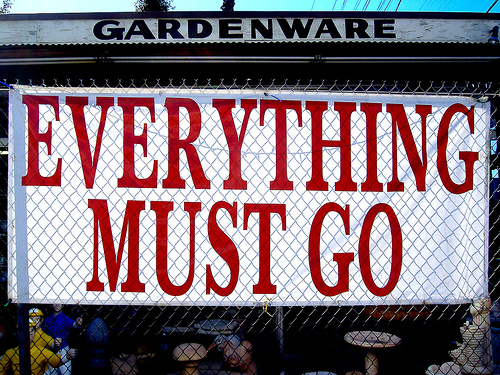One of the few personal finance bloggers who remains on speaking terms with us is Nelson Smith at Financial Uproar, who’s hosting a stock-picking contest. We were told to submit 4 stocks by December 30. We’ll regroup 359 days from now, assuming we can stave off nuclear war with Iran, and see who gained the most.
We had to pick stocks, as opposed to other investments, otherwise we’d have loaded up on “Mitt Romney will be elected” futures at InTrade. They currently pay 8-to-5.
Of course, entering a stock-picking contest is different than investing. As any poker player knows, the game changes drastically when there’s real money on the line. So knowing that finishing dead last will hurt nothing more than our egos, we were fairly aggressive. With a couple of caveats:
1. We’re not going to win this thing.
Seriously, we won’t. Not that we don’t believe in ourselves, but intelligence and discretion will only take us so far here. Luck is a huge variable, both as a noun and an adjective. Again, if we could buy futures as part of this contest, we’d look long and hard at buying one called “The winner will have chosen 4 penny mining stocks on the TSX Venture Exchange”.
But that depends on how many entrants Nelson gets. (12, including himself.) The more entrants, the greater the chance of luck being the biggest determining factor (and rendering our research worthless.) If the objective is to make money, then you don’t have to win this contest to win, if you catch our drift.
2. We’re not looking for long-term investments. We’re not even necessarily looking for stocks that we think will instantly skyrocket. The window is specific: 1 year. A stock whose acceleration will top out in 2 months, or 24 months, won’t do us much good. Heck, if we can get a 25% return out of this contest, we’ll consider ourselves winners. Nelson probably won’t, but we will.
That’s enough qualifying, don’t you think? On with our picks. Our strategy is the same as it is in our real lives: look for temporarily wounded value. A stock with good fundamentals but bad (in the short run) publicity is ideal. A low price-earnings ratio, and either negative or non-existent headlines.
NETFLIX
This fits our criteria almost perfectly. The company took a public relations hit this past summer when it told customers they were going to have to suffer through the barbaric ordeal of having to hold separate accounts for renting DVDs and for streaming videos online. Customers swore they’d never return, and a movement took hold.
We don’t patronize Netflix, never have and never will, but couldn’t understand why customers decried a company that seems to offer selection, speed, and value.
The stock traded at $304.79 in July and is now at $79.30. Cash flow is positive, and profit increases by 50% or so annually. That can’t last forever, but all the indicators are good. Netflix is one of those companies that does better the less it charges. In its early days, memberships cost 4 times what they do today. A company that succeeds on both high markups and low markups will get our attention every time, especially when it’s the undisputed market leader.
FORD
A strikingly low price/earnings ratio, barely over 6. A stock price at an 18-month nadir. And an implicit guarantee that the taxpayers will be there with billions to prop up the company if necessary. Which it won’t be, but investors like to keep these things in mind.
The industry itself is as close to a staple as we have in this society. Ford’s competitors remain in even worse shape than it.
Ford’s worst days are behind it. Yes, its liabilities are greater than its assets, but the numbers are going in the right direction. And the company is profitable. There’s no way we’d invest in Ford until its financials improve a little more, but to enter a stock-picking contest with no downside? Sure.
(NOTE: Not to hedge our bets, but the two of us had to flip a coin on this one. Ford vs. Toyota. If it turns out that a Toyota pick would have ended up winning the contest for us, blood will be shed.)
SEACUBE
This is one of those under-the-radar companies that you never heard of until 2 seconds ago, yet that impacts your life greatly. As the name implies, and as its NYSE ticker symbol (BOX) reinforces, SeaCube deals in shipping containers. The company is on every continent, and just about every freighter.
SeaCube doesn’t even make the containers. It only buys and leases them. Revenue is stable, with a couple of anomalous items distorting the 2009 numbers. Profit margins are enormous, 22%. The company paid out a dividend last month, with a dividend yield of 6.3%.
What gets us excited is its price/earnings ratio, currently under 8. Its peers average thrice that. Because a container lessor can’t expect gigantic growth year-over-year, the only remaining legitimate reason for SeaCube’s low P/E is simply that it’s undervalued. The price is low with regard to sales, with regard to book value…
So why isn’t it more expensive? It’s carrying a lot of debt, although that debt is relatively stable year-to-year. This is one we might buy in the real world, too.
TOYOTA
Alright, fine. We were going to go with GlaxoSmithKline but it’s trading at 40-something times earnings and pharmaceutical companies (or more specifically, reaction to and regulation of them) can be fickle.
Instead, the car manufacturer whose 2011 was as bad as anyone else’s in Japan. The Tōhoku earthquake and resultant tsunami didn’t just kill 20,000 people, they did a number on every manufacturer in the country. No hydroelectric and nuclear power meant no way to build cars, and a damaged seaport meant nowhere to send and receive shipments. Toyota’s sales numbers suffered, and the stock price tumbled accordingly. A positive, at least as far as stock-picking contests go.
Besides, Toyota already knows all about singular events hampering its stock price. In 2009 a series of Lexus owners testified on Capitol Hill that their vehicles were accelerating suddenly and without apparent impetus. What made that unusual was that it’s usually politicians lying through their teeth in D.C., not private citizens. The claims were unfounded: to keep it brief, these imbeciles all confused the brake pedal with the gas. Toyota stock sank to the point where the CEO flew over from Aichi headquarters to control the damage. The stock rebounded and then some, and Toyota maintained its healthy habits of keeping debt under control and buying back treasury stock. Which it continues to do today.
So those are our picks. We’ll keep you updated daily on what they’re doing.
No, of course we won’t. You shouldn’t look at your investments daily, either. We’ll check back on ours quarterly: enough time to see legitimate growth (or shrinkage) develop, without keeping us daily enslaved to a series of numbers beyond our control.
**This article is featured in the Baby Boomers Blog Carnival One Hundred Twenty-sixth Edition**





